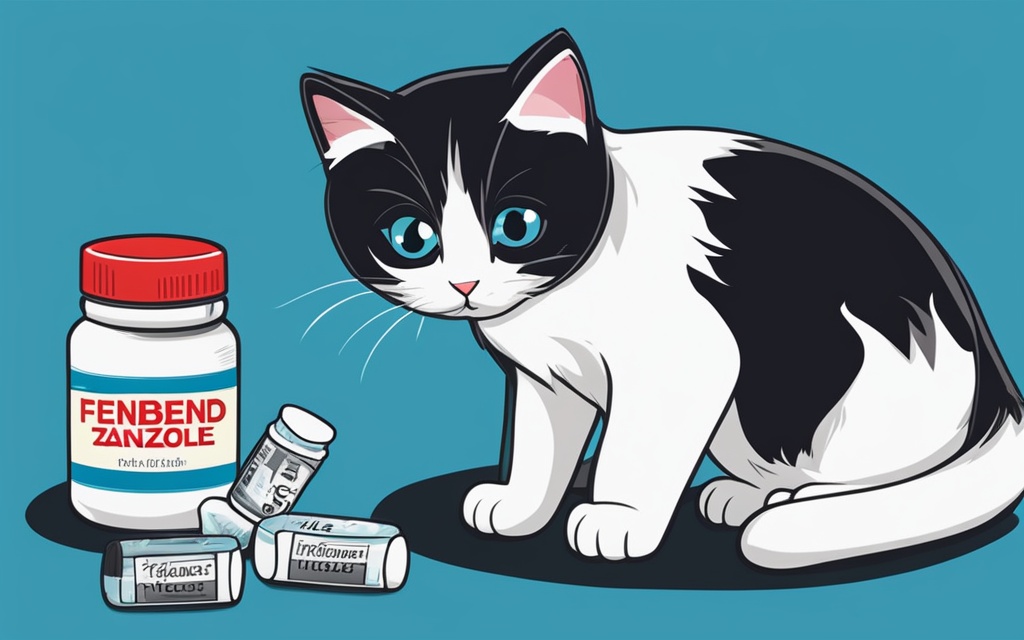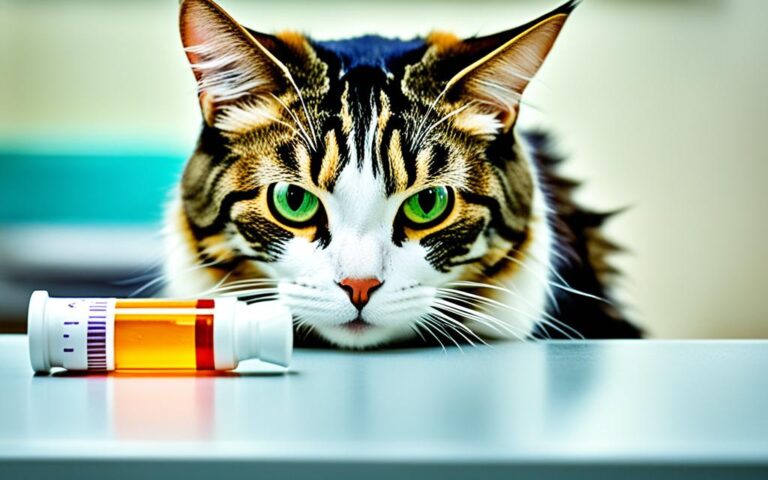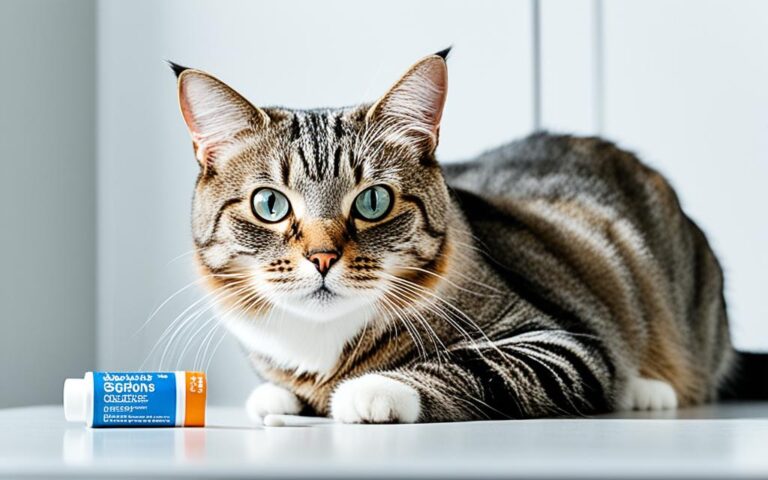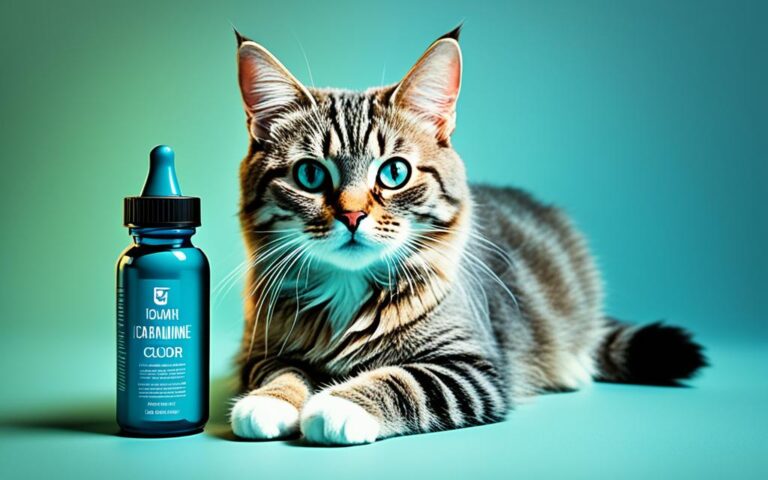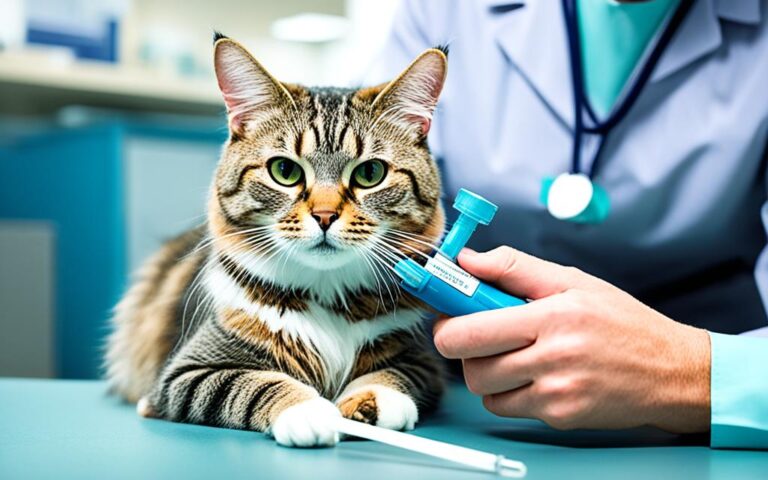Fenbendazole – Panacur & Safe-guard for cats FAQs
Did you know that Panacur Oral Suspension treats worms in cats as young as 2 weeks old1? It can handle roundworms, tapeworms, and lung worms. This makes it super useful for both pets and vets. Let’s dive into fenbendazole, looking at how it works, the right amounts, and keeping cats safe.
Key Takeaways
- Fenbendazole helps control worms in cats and kittens from 2 weeks onward.
- It works against lots of common worms, such as roundworms and tapeworms.
- Cats of different sizes get different doses, including special care for pregnant cats.
- Few cats get sick on this, just some upset stomach sometimes.
- It’s good to use regularly in older cats to keep them worm-free.
Table of Contents
What is Fenbendazole (Panacur®, Safe-guard®) for Cats?
Fenbendazole is a common medication for pets. It fights intestinal worms and other parasites in cats2. Even though it’s approved for dogs, horses, and others, cat vets use it too2. Fenbendazole comes in forms like granules and pastes with the brand names Panacur® and Safe-guard®2.
Medication Overview
It’s a benzimidazole type good against many internal parasites2. Sometimes, vets will mix it themselves if regular drugs don’t work2.
FDA Approval and Prescription Requirement
Powder and paste fenbendazole can be bought without a prescription. But, the liquid form needs a vet’s go-ahead2. Granules are okay for dogs and some big cats, but not for house cats specifically3. Yet, many cat vets still use it off-label to worm cats4.
Common Brand Names and Forms
Fenbendazole goes by the names Panacur® and Safe-guard®2. It’s made as granules, liquids, and paste2. The strength varies by form, like 22mg/g for granules3.
Used well, fenbendazole helps with worm problems in cats. Knowing its basics and where to get it can guide cat owners. This way, they can care for their pet’s health the right way.
How Fenbendazole Works in Cats
Mode of Action and Mechanism
Fenbendazole is the main ingredient in Panacur® and Safe-guard®. It fights against parasites by interrupting their cell transport system5. This drug specifically affects the microtubules in these cells6. When used in high amounts, it can also stop these parasites from making energy. This eventually kills them5.
This drug’s way of working is well known. It stops parasites from using glucose, their main energy source. This leads to their energy running out and they die5. This method is very good at fighting various intestinal parasites in cats, such as toxocara and trichuris5.

Fenbendazole also boosts a patient’s neutrophil count, which helps fight cancer growth7. White blood cells are positively affected too, helping to kill off cancer cells7.
“A clinical case study highlighted the successful treatment of small cell lung cancer using Fenbendazole, CBD, Curcumin, and vitamin E.”7
Even though studies on fenbendazole’s role in treating cancer are new, they show promise. This drug might do more than just fight parasites7.
Parasites Treated by Fenbendazole in Cats
Fenbendazole, known as Panacur® and Safe-guard®, fights a wide range of internal parasites in cats8. It works on roundworms, hookworms, and Giardia. But, it doesn’t work on all parasites, like Dipylidium caninum or Isospora8.
It’s vital to give fenbendazole for at least 3 days for whipworms and 5 days for Giardia to work8. You can find this medication in powder, liquid, or paste form. You can buy it without a prescription, but vets often recommend it for indoor cats8.
Other dewormers, like Febantel and Drontal®, are good for specific parasites too8. For some worms, your vet might use Ivermectin. And Praziquantel is great for tapeworms and safe for pregnant cats and kittens as young as 4 weeks8.
| Parasite | Fenbendazole Effectiveness | Other Deworming Options |
|---|---|---|
| Roundworms | 8Effective | 8Febantel, Pyrantel + Praziquantel, Ivermectin |
| Hookworms | 8Effective | 8Febantel, Pyrantel + Praziquantel, Ivermectin |
| Whipworms | 8Effective (requires 3+ days treatment) | 8Febantel |
| Tapeworms | 8Effective against some species | 8Pyrantel + Praziquantel, Praziquantel |
| Giardia | 8Effective (requires 5+ days treatment) | 8Metronidazole, Combination of Fenbendazole and Metronidazole |
| Coccidiosis | 8Not Effective | 8Toltrazuril |
Fenbendazole is a key tool to combat many internal parasites in cats8. It’s best for roundworms, hookworms, whipworms, and Giardia. But, know that other options might work better for some infections8.
Giardiasis is serious for both people and cats, causing diarrhea. Cats can spread this more than we realize, so it’s crucial to prevent and treat it9. Clinical signs include weight loss, diarrhea, and sometimes vomiting, with most cats not running a fever9.
To treat Giardia, vets often use Fenbendazole or Metronidazole for 5 to 7 days9. They work well together if the infection doesn’t go away. Cats usually get better, but older or weak cats have a harder time9.
“To avoid spreading Giardia, keep things very clean. Use products like Chlorine bleach or Lysol® and make sure your home is dry.”9
Besides Giardia, Fenbendazole is also used against other parasites in cats4. It’s given once daily for 3 days, then repeated 2-3 weeks later4. It starts working in a day or two. Side effects may include vomiting or diarrhea. Avoid using it on cats younger than 6 weeks4. It doesn’t clash with other drugs4.
Side Effects and Precautions
Fenbendazole, found in Panacur® and Safe-guard®, is safe for cats at the right dose10. Some cats may experience mild issues like diarrhea, vomiting, or drooling10. But, if a cat has many parasites, these side effects might be stronger.
Potential Side Effects
- Diarrhea
- Vomiting
- Drooling
These issues don’t happen often but are worth knowing about10. If your cat shows bad signs, talk to your vet right away.
Precautions and Contraindications
Don’t give fenbendazole to kittens under 6 weeks old or to sick cats10. If your cat is very sensitive, use it carefully11. Tell the vet about any other medicines your cat takes.
It’s safe for pregnant cats and can stop Giardia spread to their kittens10. But always check with a vet before giving it to pregnant or nursing cats10.

Fenbendazole is generally safe and effective as a dewormer for cats1011. But, it’s important for pet owners to know the possible side effects. Always talk to your vet first, especially for kittens, pregnant cats, or cats with other health issues101211.
Dosing and Administration
Administering fenbendazole to cats is crucial. Follow the dosage instructions from your vet13. Normally, cats receive 20 mg/kg of fenbendazole daily for three to five days13.
Dosage Guidelines
Knowing your cat’s weight is crucial for correct dosage. Fenbendazole should be given for three to five days13. Consult your vet for a treatment plan. It’s essential to finish the entire treatment, not just when symptoms ease13.
Administration Instructions
Give fenbendazole by mouth, mixed with food or through a syringe, as your vet instructs6. The powder mixes well with food, but the liquid must be given directly6. The right way of giving the medicine is vital for success.
Cats might get upset stomachs from fenbendazole, showing signs like vomiting or diarrhea13. If this happens, contact your vet right away.
Always let your vet decide the right fenbendazole dose and how to give it, based on your cat’s needs. Proper use is key to effective and safe treatment13146.
Missed Dose and Overdose Information
If you forget a fenbendazole dose for your cat, give it when you remember15. But, if it’s nearly time for the next dose, don’t worry about the missed one16.
Overdosing on fenbendazole usually isn’t too dangerous. But, too much or for too long can lower blood cell counts15. If you think your cat had too much, get them to a vet right away16.
Sometimes, cats may feel sick with vomiting or diarrhea from fenbendazole4. This usually doesn’t happen but watch out for allergic reactions too, especially if the dose is too high4.
Your vet might want to check your cat’s poop before and after taking fenbendazole. This is to make sure the treatment works and to spot any bad reactions416.
So, give the dose you missed unless it’s almost time for the next one. Overdoses are not normally serious but can affect blood cells. Always keep an eye on your cat and follow vet advice closely for the best results15416.
Drug Interactions and Monitoring
It’s key to tell the vet about any other drugs or supplements your cat is on17. Some drugs, like glucocorticoids, can interact with fenbendazole17. Also, avoid fenbendazole if your cat has had bad reactions to certain other medicines. These include oxfendazole and mebendazole17.
Your vet might suggest doing regular checks, like fecal tests, while your cat is on fenbendazole17. Tests on humans, dogs, and cats have shown 86% to 97% accuracy in spotting infections18. When looking for Giardia in dogs, one study found FLOTAC was better than other tests18.
Always follow the vet’s guidelines when giving fenbendazole to your cat17. It’s okay for pregnant or nursing cats. But, give a lower dose, not more than 11.3 mg per pound17.
| Medication | Potential Interaction |
|---|---|
| Glucocorticoids | Drug interaction possible |
| Praziquantel | Drug interaction possible |
| Dexamethasone | Drug interaction possible |
| Niclosamide | Drug interaction possible |
Make sure your vet knows all the other meds or supplements your cat uses17. Regular checks, such as fecal tests, will help your vet know if more fenbendazole is needed1718.
Storage and Handling
It’s crucial to store and handle fenbendazole products right, like Panacur® and Safe-guard®, for cats’ treatment19.
They should be kept at room temperature, between 15°C and 30°C (59°F and 86°F), and away from direct light20. Store them in the original closed container to avoid contamination or loss of quality20.
Compounded fenbendazole needs special storage, based on the compounding pharmacy’s instructions21. Such custom mixes might need specific conditions different from what the makers suggest.
Always handle fenbendazole with care. Don’t spill it or handle it roughly. This could be dangerous if swallowed or if it touches the skin. Always wash your hands after handling it. And keep it away from kids and pets to prevent accidents21.
When pet owners store and handle fenbendazole correctly, it works better and is safer for cats19. Keeping the medication in good condition helps reach the best treatment results. And it lowers the risk of side effects20.
Fenbendazole Comparison with Other Dewormers
Fenbendazole is a powerful dewormer. However, it might not handle all parasite types in cats22. For types like tapeworms or coccidian parasites, special medications might be needed. Vets know the best way to deworm a cat based on its parasites and health.
Fenbendazole, found in Panacur® and Safe-guard®, is very effective17. It works well against whipworms in dogs, showing a 100% success rate17. It’s preferred over other dewormers because it’s gentle on the stomach. It’s also safe for pregnant and nursing dogs, needing a smaller dose17.
It’s interesting that fenbendazole might help treat some cancers too7. It, with certain supplements, could be good for many cat and dog cancers7. But, how well it works for cancer still needs more research7.
| Dewormer | Effectiveness | Potential Side Effects | Special Considerations |
|---|---|---|---|
| Fenbendazole (Panacur®, Safe-guard®) | – Broad-spectrum dewormer – 100% effective against whipworm larvae in dogs17 – Shows promise in cancer treatment7 | – Rare occurrences of vomiting or diarrhea in about 1% of dogs22 – Allergic reactions to compounds excreted by dying parasites are uncommon17 | – Safe for use in pregnant and nursing dogs with a lower dosage17 – May not be effective against all types of parasites, requiring additional dewormers22 |
| Pyrantel Pamoate | – Effective against roundworms and hookworms | – Potential side effects include vomiting, diarrhea, and loss of appetite | – Not effective against tapeworms or certain other parasites |
| Praziquantel | – Effective against tapeworms | – May cause temporary side effects like nausea, vomiting, and diarrhea | – Not effective against other types of parasites |
In short, while fenbendazole is useful, it’s not a one-size-fits-all. Vets will choose the best deworming plan for a specific cat. The cancer-fighting ability of fenbendazole looks hopeful, but it needs more research22177.
Conclusion
Fenbendazole is a widely used dewormer for cats. It works against many internal parasites. These can include roundworms, hookworms, and giardia. There is even hope it might help fight cancer2324.
Cats usually tolerate fenbendazole well and it is safe for them. But, talking with a vet is very important. This is especially true for figuring out the right dose and checking for any health issues or drug interactions23.
The price and where you can buy fenbendazole can change. Some types, like Safe-guard®, are easy to find in pet stores and not too expensive. Others, such as Panacur®, might need a prescription25. No matter the kind, always get advice from a vet before giving it to your cat.
FAQ
What is fenbendazole and what are the common brand names?
Is fenbendazole FDA-approved for use in cats?
How does fenbendazole work to kill parasites in cats?
What types of parasites can fenbendazole treat in cats?
What are the potential side effects of fenbendazole in cats?
Are there any precautions or contraindications for using fenbendazole in cats?
What is the proper dosage and administration of fenbendazole for cats?
What should I do if I miss a dose of fenbendazole for my cat?
Are there any known drug interactions with fenbendazole for cats?
How should fenbendazole be stored and handled?
Is fenbendazole the only dewormer that can be used for cats?
Source Links
- Buy Panacur Oral Suspension For Cats And Dogs – Free Shipping
- Fenbendazole (Panacur®, Safe-guard®) for Dogs and Cats
- Fenbendazole for Cats: Overview, Dosage & Side Effects – Cats.com
- Fenbendazole | VCA Animal Hospitals
- Fenbendazole in Veterinary Medicine – Facts and Information | PetCoach
- Panacur Dosage Charts | Hyperdrug
- Could Fenbendazole Treat Cancer in Dogs and Cats?
- Dewormers
- Giardia in Cats | VCA Animal Hospitals
- The Side Effects of Panacur in Cats | Cuteness
- | What is fenbendazole? How does fenbendazole work? Homelabvet Blog
- GUIDELINE for Giardiasis — ABCD cats & vets
- Fenbendazole for Cats: A Comprehensive Guide to Dosage and Benefits
- Panacur For Dogs: Safe Dosages And Uses
- How to Deworm Your Dogs Using Fenbendazole: A Comprehensive Guide
- Fenbendazole for Dogs | Wag!
- Effectiveness of Fenbendazole and Metronidazole Against Giardia Infection in Dogs Monitored for 50-Days in Home-Conditions
- Panacur Granules for Cats : Panacur Wormer Granules
- Panacur ✔ Fenbendazole Powder | Online Vet Pharmacy | Pet Meds
- Fenbendazole for Dogs – DogCancer.com
- Frontiers | Effectiveness of Fenbendazole and Metronidazole Against Giardia Infection in Dogs Monitored for 50-Days in Home-Conditions
- Fenbendazole for Pancreatic Cancer: What Research Shows
- Treating internal parasites with Fenbendazole

